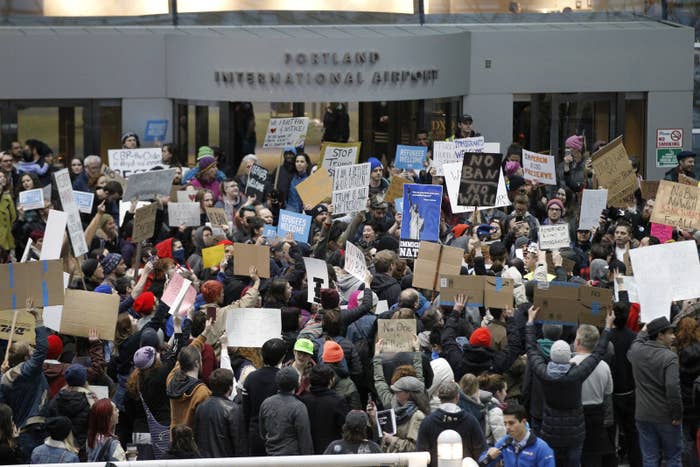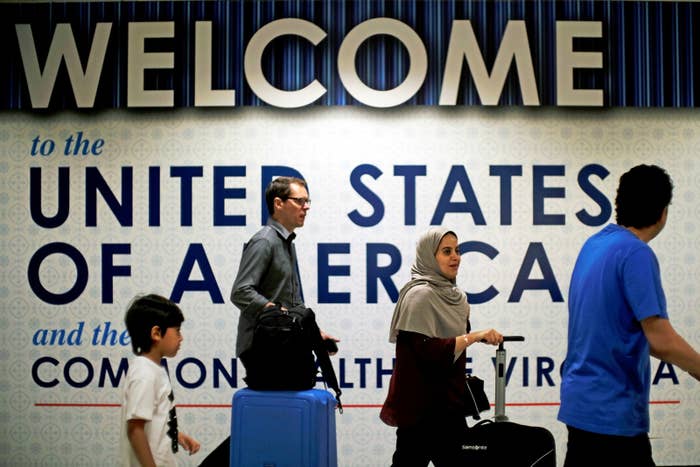
Spokespeople at the US State Department and Department of Homeland Security say more information about the implementation of President Donald Trump's travel ban will be coming Thursday — the same day the ban could go into effect.
News organizations reported on Wednesday night, however, that the State Department was already alerting US embassies and consulates across the world about new policies for enacting the executive order.
On Monday, just before 10:30 a.m., the Supreme Court partially lifted federal court injunctions of the travel and refugee bans laid out in Trump's revised March 6 executive order. The high court's ruling allows the government to enforce the ban for people with no connections to the US, but keeps the injunctions in place for "foreign nationals who have a credible claim of a bona fide relationship with a person or entity in the United States."
Under a June 14 memorandum signed by Trump, the bans can go into effect 72 hours after courts allow them to be enforced. That timeline means the bans could take effect as soon as 10:30 a.m. on Thursday, June 29.
The federal government has yet to say publicly when the bans will go into effect, but CNN reported that a senior administration official said the ban is to go into effect at 8 p.m. Thursday — timing that matched what a nongovernmental source told BuzzFeed News was expected. The federal government also has not publicly specified how agencies will define and enforce "a credible claim of a bona fide relationship."

"We continue to work with the Departments of State and Justice on the way-forward for implementation of the Executive Order based on the Supreme Court’s ruling," Homeland Security spokesperson Joanne Talbot told BuzzFeed News on Wednesday afternoon. "We’ll release additional information tomorrow."
Nonetheless, on Wednesday evening, the Associated Press and, later Reuters, reviewed a State Department cable sent to US embassies and consulates, laying out the department's criteria for determining who has the "bona fide relationship" required to travel to the US.
As the AP described it, a visa applicant from one of the six affected countries "must prove a relationship with a parent, spouse, child, adult son or daughter, son-in-law, daughter-in-law or sibling already in the United States to be eligible."
According to both reports, many significant familial relationships would not qualify under the new policy. "[C]lose family 'does not include grandparents, grandchildren, aunts, uncles, nieces, nephews, cousins, brothers-laws and sisters-in-law, fiancés, and any other "extended" family members,'" Reuters wrote, quoting the cable.
Refugee applicants would, for the most part, be subject to the same requirements, according to the AP.
Asked about the cable and the new reports on travel ban policies, State Department spokesperson Pooja Jhunjhunwala wrote, "The AP story references internal Department communications, which we do not comment on."
As to the timing of the ban's implementation, she echoed the Homeland Security statement, saying that the State Department "can provide updates on timing tomorrow, as they become available."
The immediate implementation of the original January travel ban executive order led to significant confusion at airports across the country, with the chaos serving as a backdrop for the lawsuits that began appearing in courts that weekend.
Lawyers for the plaintiffs in both cases challenging the ban before the Supreme Court told BuzzFeed News Wednesday that they have received no information from the federal government about its implementation plans.
The Justice Department, meanwhile, initially referred questions to the Homeland Security and State departments. After the AP story was published, a Justice spokesperson reiterated that the department had not released any information about the new policies.
Earlier in the week, a spokesperson had said the Justice Department would be making one of the most significant decisions before the bans are implemented. In a briefing on Tuesday, State Department spokesperson Heather Nauert told reporters the department "will be looking to the Department of Justice to get more clarification on what a bona fide relationship will be."
Nauert explained that State was working with Justice and Homeland Security to establish "what that terminology will look like." Referring to the Justice Department, she said, "They’ll make that designation and determination, and then we’ll follow through with it."
Nauert added that "everybody wants to get this right," so "they’ll probably take their time – as much time as they have – to make sure they get it right so that we can get that information and then get that out to our folks overseas."
Still, there was not much clarity at all in the Tuesday briefing because, as Nauert acknowledged, "[T]his is all still in flux and the lawyers are going through it."
The State Department had provided no on-the-record response to BuzzFeed News' inquiries about the department's implementation plans earlier Wednesday.
Under the revised travel ban, the six countries subject to the 90-day ban are Iran, Libya, Somalia, Sudan, Syria, and Yemen.
As to the refugee program — which will be halted for 120 days for those without credible claims of ties to the US — Nauert did state that it would not go into effect for those refugees scheduled to travel to the US through July 6.
"[W]e have advised our refugee resettlement partners overseas that they should currently proceed with the resettlement of refugees who are scheduled to travel to the United States through July the 6th," she said. "Beyond July the 6th, we are not totally certain how that will work because, again, this is in flux, this is in progress."
Nauert also noted the country is about to reach the 50,000-refugee cap set by Trump in the order.
"We expect to reach that cap within the next week or so," Nauert said. Although the Supreme Court ordered that the cap cannot be used to halt refugees with "bona fide relationship" claims, the court otherwise allowed the 50,000-person limit to go into effect.

